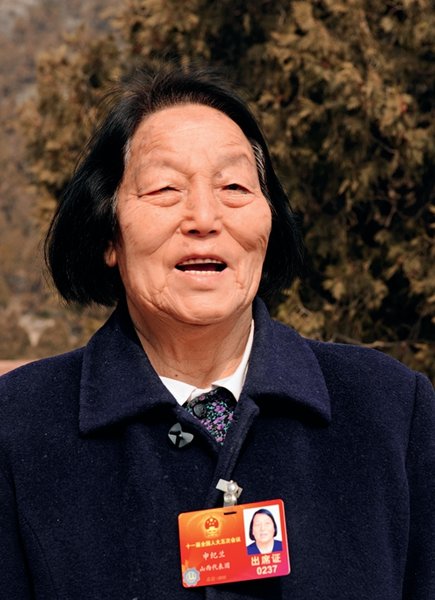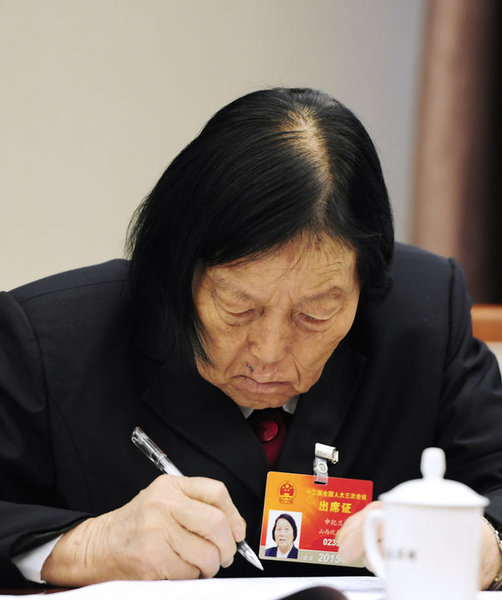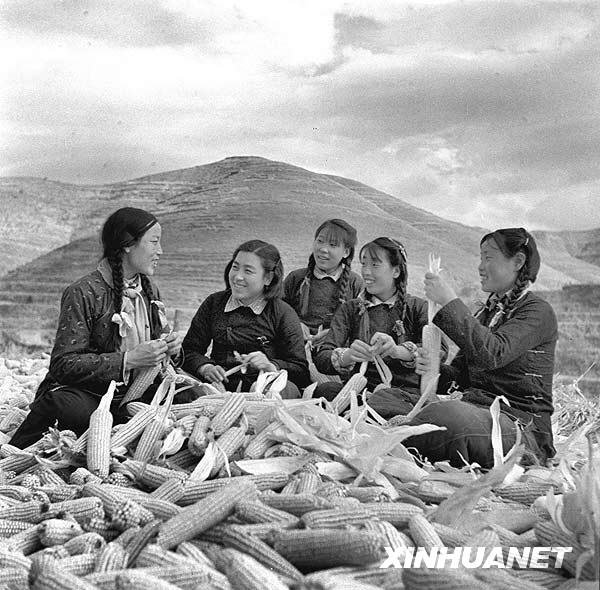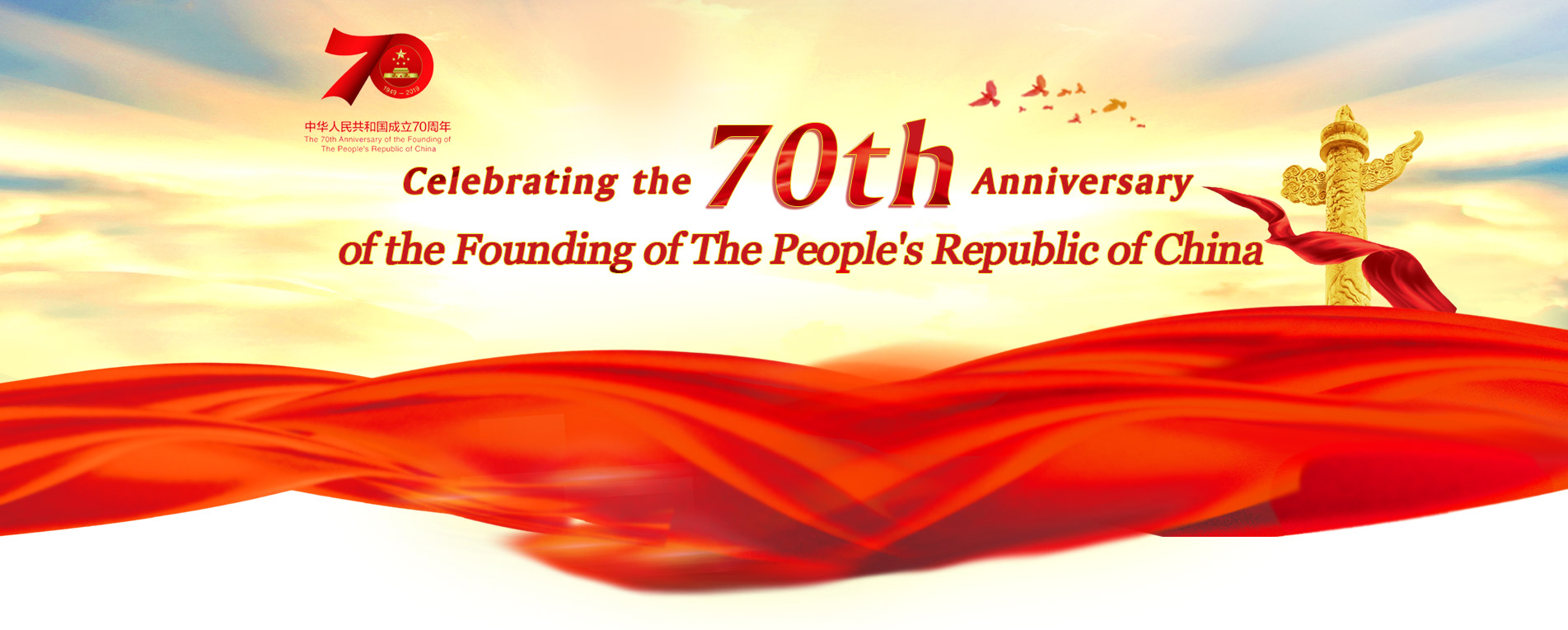Rural Woman Proposes Idea of Equal Pay for Equal Work in China
 |
| Shen Jilan [Women of China/Fan Wenjun] |
Shen Jilan, an ordinary rural woman in China, has created one miracle after another during the past six decades. She has received various accolades and special titles. For example, she has been named a National Model Worker and a National March 8th Red-banner Holder. She is the only person who has served 12 terms as a deputy to the National People's Congress (NPC), China's top legislative body. Equally as important, she became the first person to officially propose the idea of equal pay for equal work in rural China after 1949.
Shen was born in Shannandi, a village in Pingshun, a county in North China's Shanxi Province, in December 1929. During the past six decades, she has served as Deputy Secretary of Pingshun's Party Committee and President of Shanxi Women's Federation. She is now Deputy Secretary of Xigou (a village in Pingshun)'s General Party Branch and Deputy Director of the Standing Committee of Changzhi (a city in Shanxi Province) Municipal People's Congress.
Dubbed the "world's most veteran congresswoman" by her friends from other countries, Shen is the only person who has been elected an NPC deputy 12 times. During the past six decades, she has witnessed China's progress in socialist democratic political construction. Chinese media have referred to her as a "living fossil" of China's NPC system.
Equal Pay for Equal Work
In 1946, Shen, then 17, married Zhang Hailiang, a resident in Xigou, a remote mountainous village in Pingshun. In response to the county's call for residents to support China's War of Liberation (1946-1949), the village that year implemented a campaign to encourage rural residents to spin cotton and weave cloth to make clothes for PLA (People's Liberation Army) soldiers.
Given her diligence and wisdom, Shen quickly honed her skills. During the meeting to mark International Women's Day (on March 8) in 1947, the county's government commended Shen for her achievements in leading the villagers in spinning cotton. For the first time in her life, Shen tasted the joy of honor.
In 1951, the village established Xigou Agricultural Cooperative. The villagers elected Shen the cooperative's deputy director.
Shen experienced great obstacles, the following spring, when she tried to persuade women villagers to do farm work. Influenced by the traditional Chinese idea — believed by many women, especially middle-aged and elderly women — that it was right and proper for men to work outside the home, and for women to do housework and take care of children in the home, many women were reluctant to work in the fields. Shen took pains to persuade women villagers, especially those who were looked down upon by their husbands, to do farm work. She also asked the women's husbands to support their wives as they worked in the fields. Eventually, most women in the village joined Shen in doing the farm work.
According to the cooperative's regulations, a man who worked in the fields could earn 10 work points (a unit that indicated the quantity and quality of labor performed in rural people's communities as basis for payment) per day. A woman, meanwhile, could earn five work points. As many women realized they worked as hard as men, but they only got half the pay received by men, they began to complain.
As Shen pondered ways to help women earn the same amount of points as men, she came up with a brilliant idea one night: Let women do men's work. "If we can work as well as men, all male members of the cooperative will have to agree women should earn as many work points as they do," Shen thought.
The next day, Shen told the cooperative's women members about her plan. At first, many male members watched, with great interest, the women did the men's routine work — carrying manure (on a shoulder pole) to the fields and driving oxen to plow the fields. Gradually, many women became more skilled in the work. When the men realized they lagged behind in the work, they worked at top speed to catch up to the women. When the cooperative's members stopped working that day, the women completed as much work as their male counterparts did. Eventually, the women convinced the men that women should receive equal pay for equal work. Shen did not realize she had made history in China by helping women receive equal pay for equal work.
Shen came to realize women could only improve their social status by liberating themselves in production, and in improving their production skills. "We not only fought for gender equality, we also strived for the adoption of the principle 'to each according to his work.' Our efforts would benefit all laborers, including women," says Shen.
Lan Cun, a reporter with People's Daily, one of China's largest newspapers, in January 1953 reported on the cooperative's women members' victory of receiving equal pay for equal work. As the report caused a sensation throughout the country, Shen became known far and wide. In 1954, the Chinese Government approved Shen's proposal, and incorporated the principle of ensuring women receive equal pay for equal work into China's Labor Law.
 |
| Shen Jilan, who has been a deputy to the National People's Congress (NPC) since 1954, takes part in a discussion of the second group of the Shanxi Delegation for the Third Session of the 12th NPC in Beijing on March 10, 2015. [Women of China/Fan Wenjun] |
Women's Representative
Shen had a fruitful year in 1953. Several life-changing events happened during that year; for example, Shen attended the Second National Women's Congress of Chinain April 1953. At the end of March 1953, Shen was informed that she was selected a deputy to the conference. A few days later, she started her journey to Pingshun on a donkey's back. She also traveled by truck and train. It took her four days to get to Beijing. She wore a traditional, blue Chinese-style blouse, trousers with loose waist and crotch and leg wrappings, and she was especially eye-catching among the women deputies.
The congress opened on April 15, 1953. As a member of the presidium, Shen voiced the heartfelt wishes of rural women. She also shared her experience in helping Xigou's women receive equal pay for equal work. She was elected a member of the Executive Committee of the All-China Women's Federation (ACWF).
Shen will never forget how thrilled she was when she met Chairman Mao Zedong on April 23, 1953, during the conference's closing ceremony. Mao shook her hand, and he said, "You've done a great job!"
Two months later, Shen attended the World Conference on Women, organized by Women's International Democratic Federation (WIDF) in Copenhagen, the capital of Denmark. More than 1,800 women from 70-plus countries and regions attended. Shen was the only representative of farmers among the 24 Chinese deputies. For the first time in the history of New China, a Chinese women's delegation attended an international event.
"I never expected I could visit a foreign country," Shen recalls. "Before we (the delegates) left China, Premier Zhou Enlai stressed that we, who were representatives of Chinese women, must have good manners and treat others with respect."
Before they left China, the delegates received training on diplomatic etiquette. A delegate, Tian Hua, who was then a well-known actress, helped Shen put on make-up.
Given Tian's superb make-up skills, Shen, who wore a cheongsam, looked elegant and fashionable.
When Li Dequan, head of the delegation, said Shen was extraordinarily beautiful. Shen replied, "It's rather annoying to wear the cheongsam. I cannot move freely … I'll never wear the dress after I return home." Shen was true to her words. She never put on the cheongsam again.
When Shen learned some people publicly doubted whether she could devote herself to her work in Xigou after she had traveled abroad, Shen said, "I'll never leave my home village, as land is the root of my life. I'll make greater efforts to ensure the villagers' well-being."
Shen joined the Communist Party of China in October 1953. At the end of 1953, Shen was named a National Model Worker. The following year, she was elected a deputy to the First NPC, which was held in Beijing in September 1954.
Shen Jilan proposals: When Shen learned some people publicly doubted whether she could devote herself to her work in Xigou after she had traveled abroad, Shen said, "I'll never leave my home village, as land is the root of my life. I'll make greater efforts to ensure the villagers' well-being." When Shen learned some people publicly doubted whether she could devote herself to her work in Xigou after she had traveled abroad, Shen said, "I'll never leave my home village, as land is the root of my life. I'll make greater efforts to ensure the villagers' well-being." When Shen learned some people publicly doubted whether she could devote herself to her work in Xigou after she had traveled abroad, Shen said.
Interview Notes
As Shen has grown old, her back has become bent, and old-age speckles have grown more numerous on her face. Also, she has become a little deaf. However, she has always remained sober-minded. Dressed in simple attire, she has continued to look like a typical rural woman. Despite all of her achievements, Shen has maintained a low profile. She has continued to talk and act in the way an amiable, elderly farmer would talk and act.
Each year, during the slack season in winter, Shen copies the central government's documents in her office. She watches CCTV (China Central Television)'s news every day. She always reminds herself she should study hard to keep pace with the times.
A few years ago, Xigou began taking steps to strengthen its management over residents' houses, in part to promote rural economic and social development. To save land, Shen had her old, three-room house torn down to build a two-story house. She keeps her old, long bench in her simply furnished house.
During the past few years, Shen has done her best to help many local residents solve the difficulties in their lives. She has also helped some residents resolve family disputes.
In addition to participating in social activities, Shen grows crops in a field. "Food is a big issue for China, a populous country … As a model farmer, I should lead farmers to do our best to increase grain production," says Shen.
Due in part to Shen's efforts, in encouraging Xigou's residents to work hard to improve their lives, tremendous changes have taken place in the remote mountainous village during the past several decades. Now, all of the residents can use safe, running water, and they can walk along the paths, which have been paved with cement. In 2015, the villagers' total combined income reached 120 million yuan (US $17.91 million), and their annual per capita income was 8,000 yuan (US $1,194), which had quadrupled over the previous year.
Over the past 60 years, Shen has led Xigou's residents in the planting of trees in the village. Shen's heart is always filled with pride and delight, especially when she looks at the flourishing trees on the hills that surround the village. She believes planting trees on the hills will benefit later generations.
Shen has witnessed the tremendous historical and social changes during the past dozens of years. Although her life story can be written into a thick book, she remains pure-minded. "Despite the passage of time, I remember my original dream, and I follow my heart. I will do my best to help the people improve their lives," Shen says.
 |
| Shen Jilan (1st, L) at a young age. [Xinhua] |
(Women of China)
Please understand that womenofchina.cn,a non-profit, information-communication website, cannot reach every writer before using articles and images. For copyright issues, please contact us by emailing: website@womenofchina.cn. The articles published and opinions expressed on this website represent the opinions of writers and are not necessarily shared by womenofchina.cn.

 京公网安备 11010102004314号
京公网安备 11010102004314号